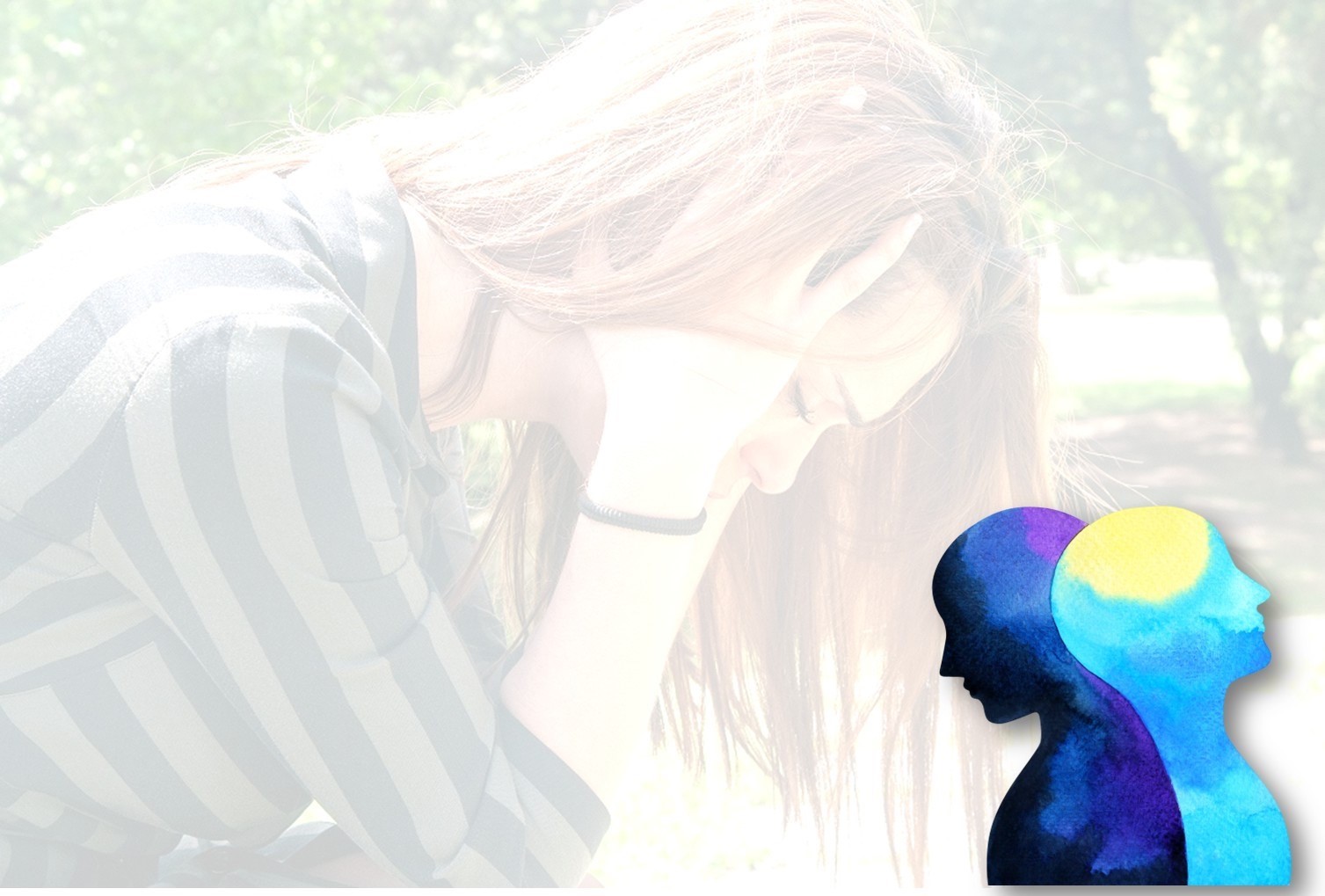Bipolar disorder, formerly called manic-depressive disorder, is a mental health condition with extreme mood swings, include “up” (manic) and “down” (depressive) episodes, affecting ability to perform everyday life tasks at school or work and maintaining relationships. However, some people may experience only manic episodes of abnormally upbeat, overly confident, hyperactive or aggressive.
Lifetime prevalence of bipolar disorder is around 2.4-4.8% in the general population1. Rates of bipolar disorder in men and women are about equal2. Onset of symptoms often starts in early adulthood.
Lifetime prevalence of bipolar disorder is around 2.4-4.8% in the general population1. Rates of bipolar disorder in men and women are about equal2. Onset of symptoms often starts in early adulthood.
What are the symptoms of bipolar disorder?
Bipolar disorder causes serious shifts in mood, energy, thought, and behavior; from the highs of mania on one extreme, to the lows of depression on the other.
During a depressive episode, a person usually loses interest in activities he/she usually enjoys and is overwhelmed with sadness, fatigue, pessimism and feeling of worthlessness or even recurrent thoughts of death which may lead to suicidal thoughts/attempts.
In a manic period, symptoms generally include persistently elevated or irritable mood and increased goal- directed activities or energy for at least 1 week accompanied by following symptoms:
- Inflated self-esteem, overly confidence or grandiosity
- Decreased need for sleep
- Talkative, talk very fast about a lot of different things
- Racing thoughts. Making lots of grand and unattainable plans
- Easily distracted, jump quickly between ideas or tasks
- Increase in goal- directed activities or agitation
- Risky or impulsive behavior with poor judgment, such as alcohol or substance use, overspending,illegal behavior or having reckless sex.
Most patients with bipolar disorder are easily irritated, agitated and aggressive, resulting in relationship problems with friends, loved ones, and colleagues. In addition, some patients can experience psychotic symptoms during severe mood episodes of mania or depression. Some may experience hallucinations, i.e. see, hear, or smell things which are not there. Others may have delusions such as believing they have special powers. Psychotic symptoms can lead to reckless or dangerous behavior.
Are my mood swings abnormal?
Naturally, everybody has mood swings or fluctuations throughout the day, according to situations. So when should we consider it abnormal or a mental condition? Diagnosing bipolar disorder requires the diagnostic criteria performed by a psychiatrist. However, generally you should go to see a doctor if you experience mood swings which…
- More severe than general people or your normal character.
- Happen without a reasonable cause.
- Change in sleep or appetite, much more or less than your normal routine.
- Each episode lasts longer than 4 days.
- Profoundly affect your daily life, tasks or relationships
What is the difference between major depression and bipolar disorder?
Bipolar disorder and depression are mental health conditions which share some similar features but need different treatments. Symptoms in depressive phase of bipolar disorder are similar to typically symptoms of major depressive disorder. However, the main difference between the two is that major depressive disorder is unipolar, without “up” period or manic phase. While bipolar disorder includes 2 poles of mood, depressive and manic. Therefore, different medications are needed to treat these two mental health conditions. Importantly, antidepressants rarely help bipolar depression and may worsen bipolar disorder by causing mania or rapid mood swing.
What are the causes of bipolar disorder?
The exact cause of bipolar disorder is unknown. However, we believe that it is a biological disorder due to dysfunction of some neurotransmitters, or chemical messengers, in the brain. Neurotransmitters are chemicals responsible for controlling brain's functions. Noradrenaline, serotonin and dopamine are the main focus of theories. Genetic factors also play an unquestionable role in the etiology of bipolar disorder3. Therefore, first-degree relatives (parents, children, siblings) of people who suffer from bipolar disorder are more likely to suffer a mood disorder than general population. While environmental influences are not the root cause, stressors may trigger bipolar disorder for those who are susceptible.
Can bipolar disorder go away spontaneously?
Although some patients with bipolar disorder experience spontaneous remission without any treatment, spontaneous recovery often takes a long time which cause profound effects on patients and burden people around them. Untreated bipolar disorder usually gets worse overtime. Generally, mood episodes will be more frequent and severe. Recurrence is very common, 45% of patients have more than one episode and 40% have a chronic disorder but proper treatment can prevent this4. So, untreated bipolar disorder can lead to many serious problems, including losing job, substance abuse, financial crises, interpersonal difficulties, and especially increased risk of suicide.
Can bipolar disorder be cured with treatment?
Bipolar disorder is treatable so people with this condition can enjoy a full and productive life. Medication is the main treatment for bipolar disorder but will provide better effect when combine with psychotherapy (talk therapy). However, each person can respond to treatment differently. So patients may need to try a few medications and therapy before finding the right ones. Lifestyle modifications are also important; adequate sleep, avoiding alcohol or abusive drugs, regular exercise, and good nutrition can be very helpful in managing symptoms of bipolar disorder.
Can bipolar disorder recur?
Recurrence rates for bipolar disorder are high even with ongoing treatment. One study found a 90% relapse rate at 5 years, with nearly half of the relapses occurring within 2 years5. However, treatment can significantly lower the recurrence. So it is important to continue medication for at least 2 years even when you feel better or reach full recovery. Most people with bipolar disorder need long-term treatment to prevent new episodes and stay symptom-free.
Role of medications in bipolar disorder
Since neurotransmitter imbalances appear to play a key role in bipolar disorder, therefore mood stabilizers are the first-line treatment to regulate neurotransmitters. Unlike anti-anxiety drugs and sedative/hypnotic drugs, long-term use of mood stabilizers does not cause addiction.
All medicines come with some adverse effects, but generally new medicines for bipolar disorder give only little adverse effects. There are several medicines for bipolar disorder which each has different benefits and risks. Patients should discuss with doctors about the adverse effects they are concerned to find the best option. Taking medications responsibly, combine with talk therapy and healthy lifestyle, you can minimize the risks and maximize chances of treatment success.
Self-help for people with bipolar disorder
- Having adequate ®ular healthy sleep
- Healthy life styles such as regular exercise and healthy diet. Avoid smoking, alcohol and illegal drugs.
- Practice relaxation techniques, meditation or yoga.
- Taking medication as instructed. Don’t abruptly stop, skip or change the dose of your medicine without discussing with your doctor. Talk to your doctor if you experience any adverse effects.
- Frequently monitor your moods. Learn to recognize warning signs of an oncoming manic or depressive episode and go to see your doctor right away.
- May let your family members or close friends help watching out for warning signs and symptoms of bipolar disorder.
Tips for relatives of a person with bipolar disorder
- The more you understand about this complex illness, the better you can help your loved one cope with its challenges.
- When hurtful or destructive behavior emerges during a bipolar episode, try not to take it personally.
- Encouraging treatment adherence. Set up a time for taking medications, and keep regular meal and bed times to ensure adequate sleep and good nutrition.
- Watching for symptoms or mood changes and encourage the patient to see a doctor immediately before symptoms get worse.
- Help to prevent overspending and reckless or risky behavior
- Strongly support and assist our loved one to live a normal life after recovery.
In conclusion, bipolar disorder is pretty common but it is not a scary or embarrassing disease. Getting help early and comply with treatment are the keys to recover and have your life back.
For the latest updates on sea.progress.im, subscribe to our Telegram Channel https://bit.ly/telePiM
Our correspondent’s highlights from the symposium are meant as a fair representation of the scientific content presented. The views and opinions expressed on this page do not necessarily reflect those of Lundbeck.




